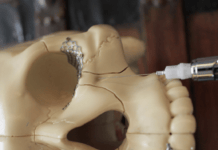Networking can be intimidating, but it is necessary for your continued success. Networking is a form of communication in the professional world. Networking can occur inside and outside the dental profession.
As with many things in life, it’s who you know. I’ll use my father as an example. He is not in the dental profession, but he is a professional at networking. He is one of those people that can’t go anywhere without knowing at least one person. If his car is acting funny, he knows a guy to call for help. Networking can advance your career, help find a new job, obtain additional resources and professional advice, and so much more.
Where Does One Network?
Everywhere. Every day. You network with new people every day; you may not just realize it. When you start a new job, you network with the other employees and your employer (and even your patients). Trade shows, continuing education courses, and conferences are the big three when it comes to networking.
Need a new instrument? You most likely need to communicate with a representative. You can start small like introducing yourself or asking a question. Once you make that initial contact, the networking relationship begins.
Are you on Facebook or other social media websites? That is a form of networking. Social media networking can be as valuable as regular networking in today’s day in age. What you post, who you follow, and how you communicate all correlates together. There are online communities/groups on social media that are there for the purpose of networking. There are groups for all dental professionals, specific geographic locations, or something smaller in scale.
Are you on job search websites? There are thousands of different job search websites. That is another example of networking because you are sharing and communicating back and forth with a possible employer. Even if you do not get the job, they may keep you in mind for future positions. You connected with another professional, and that is how your network grows.
Not all of your “branches” or contacts from your networking will lead to further “branches.” It may just stop there for that specific connection, and that is okay. Some branches are longer and stronger than other ones. Other branches may be shorter, thinner, and even break off.
Some Quick Network Tips
- Practice being mindful when you are communicating. Mindful communication is when you are aware of what you and others are saying. There is a purpose to the conversation. Avoid being mindless, which means there is not conscious thought behind it. The communication may seem very generic, and very faceted.
- Networking flows the best when you are not overthinking your next thought. You can be prepared for what you want from networking, but you don’t need to plan out a whole conversation.
- Not all networking attempts are successful. Some individuals in your networking “web” or “tree” may fall through overtime as well. That is still normal.
- Reach out to past mentors, colleagues, or other trusted professionals to help connect you with others. For example, if you are looking for advice, additional resources, or maybe a new job opportunity, this could be one route for starting. I have had much success with this strategy. I met one individual, and they introduced me to a whole room of dental professionals. Today, I communicate with many of them frequently due to that initial networking opportunity.
- If your goal is to find a new job, make sure all needed materials such as resume and cover letter are updated. This may also include updating your online resumes on job search websites.
It’s OK … It Takes Time
Networking doesn’t come easily to everyone. I definitely wouldn’t categorize myself as a social butterfly, but I consider myself improved at socialization. One personal example I have is being a mentor liaison, which is a resource for students in dental hygiene programs in my state. I visit my dental hygiene school a few times a year. I catch up with my professors and instructors. Just recently, I got a call regarding a possible clinical position in the program. These doors opened because of my year’s networking (without even realizing it). After the interviewing process, the rest was history. I am so excited to start next semester!
You are putting yourself out there. Communication is crucial for networking. Having conversations with different types of people also contribute to networking. My advice is to step out of your comfort zone.
Walk up to a conference booth and have a conversation with a rep. Attend your local or state component association meetings. You will definitely have a lot of opportunities to network with other dental hygienists. Eventually, you will notice that, through your networking, you are making new connections from your initial connections. And from there, your connection branches continue to grow!











